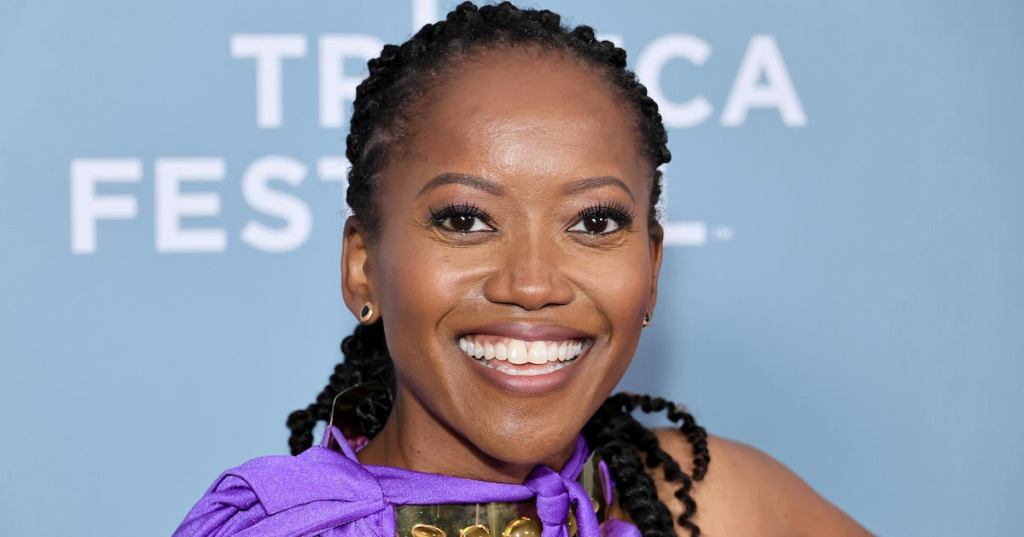After a long hiatus, STARZ’s Run the World is back, and with a few new faces. The chronicles the highs and lows that Whitney (Amber Stevens West), Renee (Bresha Webb), and Sondi (Corbin Reid) must endure in their pursuit of world domination, as their comrade Ella moves on to other adventures abroad. In Ella’s absence, Whitney must follow the road of self-discovery in order to thrive in her life with or without Ola after her cheating scandal, while Renee and Sondi must decide what they truly want out of life – in their careers and making some major and unexpected decisions for their relationships. These powerful Black women, fortified by their impenetrable friendship, won’t let anything get in their way. And now they have Barb (Erika Alexander) to guide them through, even if her advice is unsolicited.
Ahead of the Season 2 premiere on Friday, May 26, PopCulture.com spoke with Alexander about Barb’s influence this season on the ladies, and her growth in the role in the absence of a major character she was previously connected to. She also talked about the comparison to Living Single, her favorite storyline this season, and hopes for Barb’s character development. Watch the full video interview on our YouTube channel.
Videos by PopCulture.com
PC: I’m so excited to speak to you. I’m such a huge fan. I love your character in the show.
EA: Thank you so much.
PC: Let’s get right to it. Congratulations on season two of Run the World. We were nervous because we know that Ella was not going to be in season two so…
EA:
She’s on a great adventure. Yes.
PC: Yes, which we cannot spill. But without the character Ella in season two, were you nervous about how your trajectory will go on the show as far as your character was concerned?
EA: No, not at all. Because there are so many things that Barb has that I think they leveraged, which was her veteran status in the space of media. And also that she’s a boss. They’re talking about running the world, she is a boss. So to have that conversation, which is generational between people who are trying to become and a person who’s arrived was always going to be there. So I was really excited to see what would happen.
PC: Now. That was something that I was going to segue into my next question because we love Barb as being the boss that she is, and I really love the way that she was immersed into the season with the rest of the cast and her being like a hilarious voice of reason or mentor of sort. And I feel like Barb really exudes where Black women are now in the workplace and doing similar things as having multiple jobs and-
EA: Oh, for sure.
PC: [She wears] multiple hats. And in season one, something that stood out to me as a journalist was you told Ella the importance of being adaptable. How timely do you feel as if that portion of the storyline is? And do you think that there’s still a generational divide in terms of adaptability and flexibility?
EA: That’s a great question. Really brilliant. It’s everything being adaptable, being flexible, being able to see and read the room. People would call it stick and move. Know when to stay and know when to move on. That’s everything, and you usually only learn those things through experience. Sometimes people can have an instinct for it and it could work. Some people move too fast and they miss the opportunity. So it’s how to adapt not only to things around you but to how to adapt to how you grow.
Some people don’t want to admit that they’ve grown away from a person or grown away from doing a certain thing. And you’ve got to accept that life is about growth, it’s about forward progression. And so I think that very much in my life, I’ve tried to adapt as Erica Alexander and grow by teaching myself new skill sets, whether it was writing, doing more directing, or creating bigger challenges for me. If I didn’t think the industry was giving it to me, I tried to make a way for myself. And that was me adapting, that was me adapting in real-time.
PC: Now we see, as I mentioned, you being the voice of reason in this group of talented yet ambitious, and sometimes all over the place, millennials. What was your take on her role within the group in season two?
EA: She’s a life coach. Barb has always been really generous with the advice she gives. And she’s involved in their life. They like hanging around her, so they keep inviting her places, and she shows up because she is an enthusiastic person. And I really love that there is a generational conversation in this series to break the myth that you have to stay within your so-called peer sets. What’s a peer? Some people think of it as an age, they might think of it as a career. There’s nothing like that. Your tribe is made up of different many ages, different many skill sets, different many careers, and different places. And so she, I think, builds out the tribe in a really strong way.
PC: Now, we obviously loved you in Living Single, and now this show is also centered on Black women and Black women empowerment. Why do you feel as if this format is such a big formula to the success of a lot of the shows that we’ve seen that have stood the test of time and it keeps becoming a recurring theme?
EA: That’s another good question. When you started to ask me that, I started thinking about the harmony that women have when they bring their voices together. If you think about it in the 50s, and there’s a lot of harmony, but the thing that comes to mind is, “He’s the boogie woogie bugle boy of Company B.” And somebody goes, “He’s the boogie woogie bugle boy of…” You need the base, you need the middle, you need the high, you need somebody…That makes an amazing sound. And then when you put them together in terms of personality, you have a harmony that feels like one note but is many different layers. And I think that that’s why people love to see series with ensemble companies. And that’s what this is.
PC: Now in terms of Barb’s storyline moving forward, now that we see that she serves a true purpose in the group… I like the fact that you said something about when we think about peers, we think about them being in our specific age group. And I’ve always tended to friend older, and I think that I’ve learned a lot within those circles. But how do you foresee her storyline developing outside of being a mentor or just hanging out with the crew? What would you like to see as far as her character development is concerned in potentially season three and onward?
EA: Sure. I would love to see her start to take on the advice that she’s giving and see how she applies it in her life. Right now, she’s able to tell them how to apply it in theirs, but it really would be interesting to see that maybe behind the door she’s a mess. And we do see that a little bit. She’s a little bit much more messy than she gives on. And I love the mask, that she has a mask. She’s out there taking risks and doing that, but when you take the masks off, who is she? What does she have to deal with? How hard is it to be successful to keep that up? Can you keep that up? What kind of toll did it take on her? What kind of self-care is she giving herself, if at all? She may look like she has it together. It’d be really good to see her world.
PC: Now even though there were some changes this season. I love the fact that we were really able to delve into each individual storyline a little bit more. Whose story did you enjoy the most watching in season two?
EA: Wow. They all have great stories. I really liked Corbin’s story because she’s dealing with things that have to do with running up against her ambitions and somebody else’s design for her. And it’s a healthy relationship, but it’s a really complicated question. And I really love Bresha because she’s out there trying to build as an entrepreneur and she doesn’t know as much as she needs to and she finds out that there are roadblocks ahead and that’s wonderful. They have a psychologist, so let me just put it like that. They have a great psychologist, and when you talking about what they could do with Barb, it would be great to see them in group therapy, all of them, Barb included, talking. Including the men, like separate and group. I think that would be so hilarious. We’ve never seen it. I would love to see it.
PC: And overall, how are you hoping that fans react to this season? As you mentioned, we can’t give out too many spoilers, but there are some fun additions. I love that we get to see their individual families in this season. I thought that made for deeper conversations, especially with successful women in that age group. And then probably in a lot of their cases, they were the ones who made it. So I think that is also very timely with conversations going on, especially across social media. So there’s a lot of things that people can pull from this season specifically. What are you hoping the takeaways are?
EA: I think the takeaway is that the time is now. Haulass. You really don’t have as much time as you think you do. And move forward with confidence. If you don’t have confidence… You don’t need it to move forward, you’ll gain it as you go forward. And I think that you can see them working that out, but to actually apply it in your life and try to take that away that no one really knows, and yet people do know something. So figure it out some things that are wise to take with you, shrug off the rest and see where you land with it, and create a new universe.
PC: Well, it was a pleasure speaking with you. As I said, I hope we get way more seasons to come. I love Barb’s character. She reminds me of some of my older friends.
EA: I love it. I love her. I love her too. I love her too. I really appreciate your compliments. And thanks for the great questions. Wonderful.
PC: Of course. Well done. Hopefully, I’ll talk to you next year.
EA: Oh no, we will. See you.









